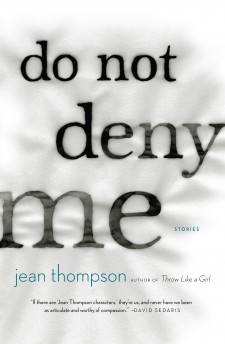 Reviewed:
Reviewed:
Do Not Deny Me: Stories by Jean Thompson
Simon & Schuster, 304 pp., $14.00
Known mostly for her short stories, Jean Thompson’s work often appears in reputable literary journals before being gathered and published in books. Her 1999 collection, Who Do You Love, was nominated for the National Book Award. Yet her new book (her ninth), Do Not Deny Me, has been released as a paperback and however much she deserves it, a breakout may or may not be imminent. On paper, then, Thompson would appear to be the classic example of that dubious species, the writer’s writer.
But it’s more accurate to say that Thompson is a reader’s writer. Her stories are immediately accessible, going down easy despite frequently bitter subject matter. Even as her characters confront financial crises, emotional emptiness, imprisonment and physical incapacitation, Thompson’s prose is deceptively casual and frequently funny. Making one’s way through Do Not Deny Me is a ride with nary a speed bump.
For starters, Thompson is great at starters. Nearly every story opens in full voice, with the perfect combination of welcome and complication. Here are just two examples:
We were broke, Bobby and me. Both separately and together, as a marital unit. It had happened without warning and without our consent. It had all taken place at a distance, in offices and institutions far from us. We had been notified by mail. We still had the house and the cars. We didn’t seriously believe we’d lose the house and the cars, but what if belief was just one more thing that would fail us?
And:
The people across the alley were spending their Saturday morning sitting in the bed of their pickup truck. The man, the woman, the three children — it was difficult to think of them as a family — had emerged from their squat little house and climbed into the truck more than an hour ago. And there they had stayed, as if this were a new amusement, the truck itself a destination.
That last opening comes from “Little Brown Bird,” a standout story about a woman named Beate who takes an interest in Kyra, one of those children in the truck. Beate works on a complex quilt while her husband, near retirement, loudly tinkers on his own projects downstairs. Kyra starts to drop by the couple’s house for visits, drawn by Beate’s dog, and Beate’s curiosity about the girl quickly develops into a motherly concern. The story, simple in its details, manages to address marriage, class, child-rearing and the limits of compassion in its 28 pages.
On the opposite end of the tonal spectrum, but just as potent an example of Thompson’s talents, is “Escape,” a pitch-black comedy about Hurley, a disabled man, and Claudine, his vengeful wife. Hurley is confined to a wheelchair and can’t speak intelligibly. (“ . . . one perfectly normal night, reading the newspaper after a dinner of fried chicken and coleslaw, his brain had misfired, had flooded with white, paralyzing light that struck him down, robbed him of his peace of mind and body and left him in his miserable state, an overgrown baby making googly noises.”) He now spends his time trying to escape from Claudine, who is “everywhere and nowhere, like a gas.” She blames Hurley for burdening her by only doing death “halfway.” Among the story’s many lacerating pleasures are these two lines: “Before all this, he had not known just how much she hated him. But then, he had not realized how much he hated her.”
This is not to say that everything on offer is a hit. The title story, about a young woman drawn to a psychic after the sudden death of a boyfriend, is not terribly believable. “Treehouse,” about a suburban husband and father whose midlife crisis leads him to build . . . a treehouse, symbolizes male regression too literally to have much of an effect.
For the most part, though, Thompson confidently weaves together heavy themes and light observation. One character, hospitalized after an accident, is inserted into a scanning machine “like a tray of cookies into an oven.” Someone worried about being laid off tells a friend and colleague, “We can’t do squat that’s really useful. Can’t grow our own food or hunt for it, or build a shelter, or make our own clothes. Just think about shoes. What the hell would you do for shoes?”
Thompson’s creations are well suited for these uncertain times. Like so many of us right now, they’re occasional optimists forced to confront sustained trouble, wisecrackers who wonder what they’re going to do about shoes.
John Williams is the editor of The Second Pass.
Books mentioned in this review:

